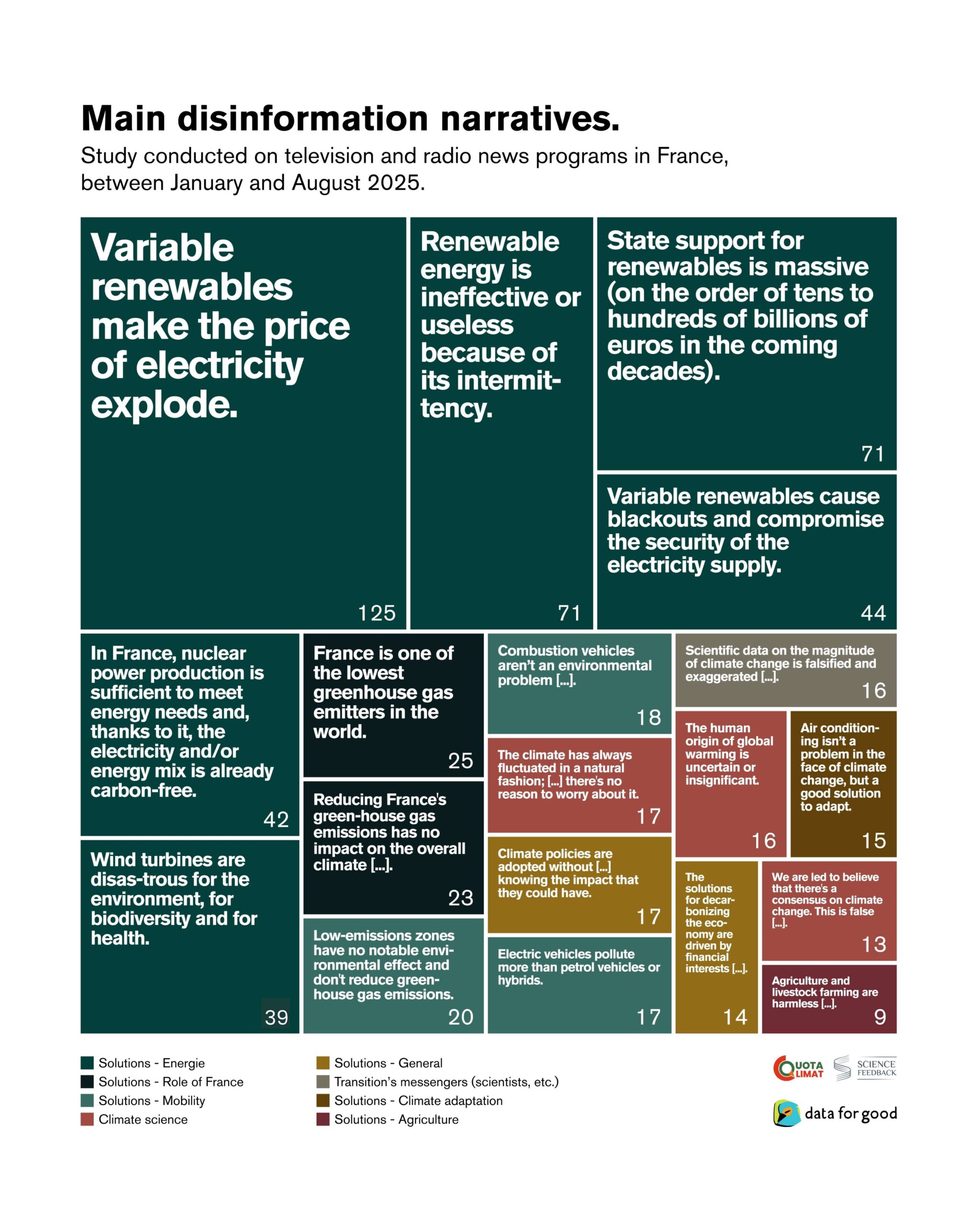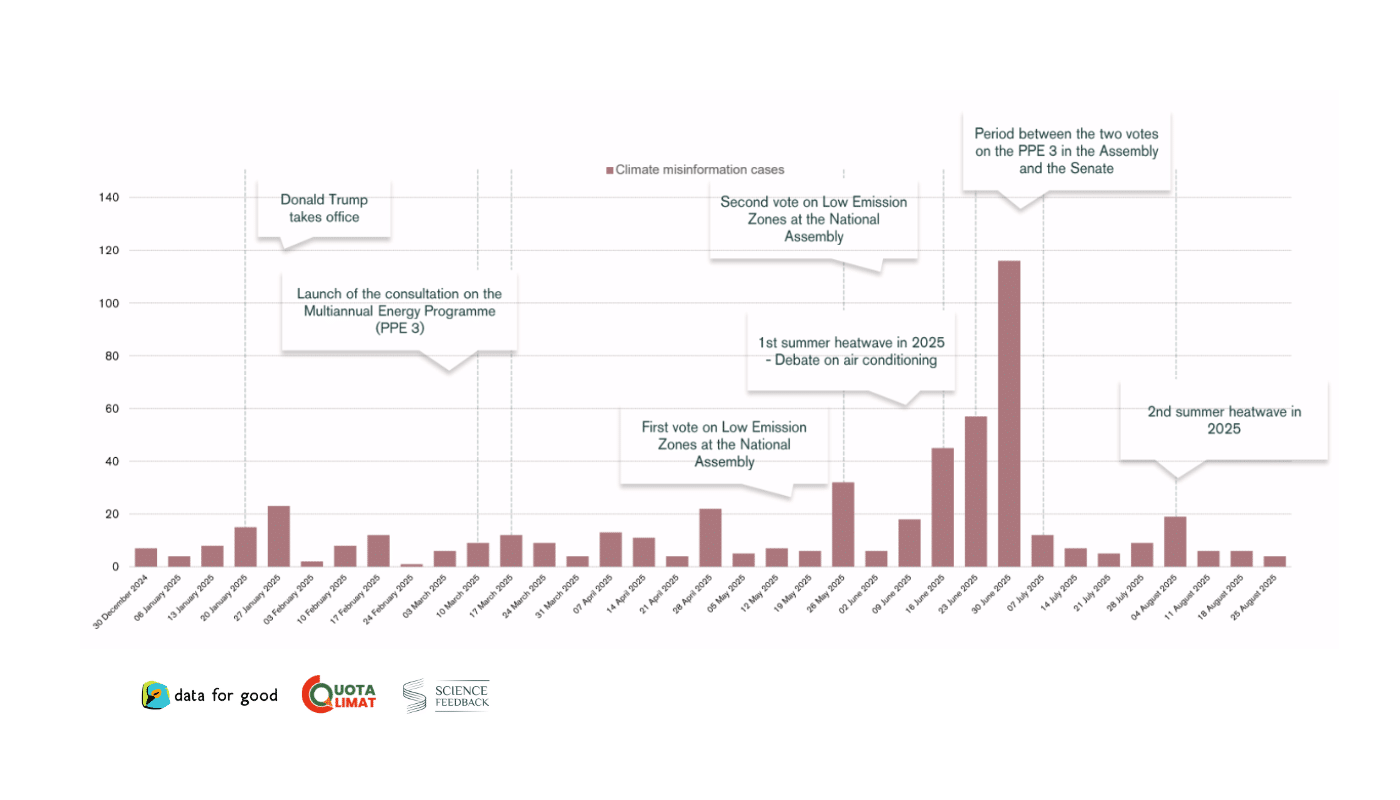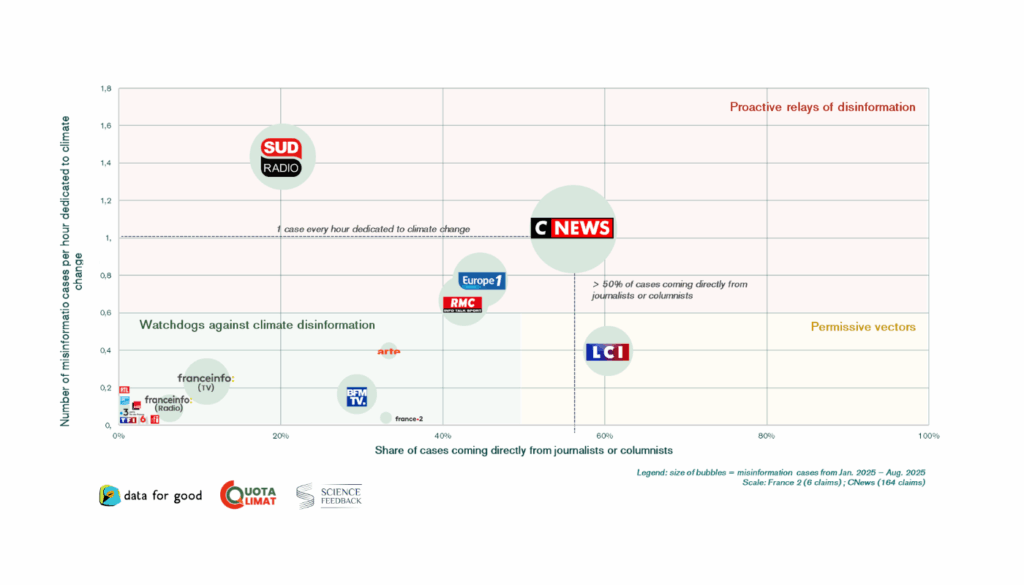A few weeks before COP 30, the NGOs Data For Good, QuotaClimat and Science Feedback are releasing the findings of their new report mapping climate misinformation in audiovisual media. They warn that 529 cases have been detected in France over the past eight months. Without timely action from the media and policymakers, climate disinformation could continue to spread across mainstream outlets, where information integrity is supposedly protected.
Climate disinformation in French media
Between January and August 2025, the following were identified :
- 529 cases of climate misinformation, defined as instances with no demonstrated intent to deceive — potentially resulting from error or exposure to misleading narratives.
- 19 climate disinformation narratives, defined as false or misleading claims posing a high risk of misinforming the public about facts established by current scientific knowledge on climate change and climate action, including mitigation and adaptation measures as outlined by the IPCC.

All of these narratives have been analyzed.
These findings show that:
- Climate disinformation is concentrated around specific moments: Donald Trump’s electoral win, debates on Low Emission Zones, discussions on the Multiannual Energy Programming, and periods of extreme heat.
- Nearly all cases have targeted the same topics since the first quarter of 2025: over 90% of identified cases relate to transition solutions (70% concern the energy sector—specifically renewables—10% mobility, and 9% France’s role in global climate action).
- Within 24-hour news channels, public broadcasters are six times less exposed to climate disinformation narratives than private channels.
- Among general-interest radio and TV stations, Sud Radio, Europe 1, and RMC are the three most exposed outlets.
- On Sud Radio, one case is detected every 40 minutes of climate-related programming, and on CNEWS, one case every hour.
- In the private sector, 46% of cases are voiced by journalists or commentators.
- In the public sector, guests (including political figures) account for 92% of identified cases.

Distribution of detected cases in France over time, January–August 2025
Comparing the number of cases per hour of climate-related coverage with the share of climate misinformation cases voiced by journalists or commentators allows for the following classification:

Mapping of major French broadcast media in relation to climate disinformation
Climate disinformation in Brazilian media
In Brazil, media coverage of climate issues is on average half as frequent as in France. This low coverage is explained by a dominant discourse that downplays the importance of climate compared with economic development, as well as by the contentious nature of social and territorial issues.
Consequently, the number of cases detected between April and September 2025 is lower than in France. Among the cases detected:
- One third occurred in September, marking a peak in disinformation.
- Three main topics emerge: agriculture and deforestation, COP 30 and climate action, and electric vehicles and bioethanol.
- In August 2025, 12% of climate-related mentions in Brazilian media directly concerned COP 30.
This rapid spread contrasts with the ability to anticipate the timing and nature of disinformation campaigns.
At the origin: identifiable actors, such as the fossil fuel industry and the far right.
In both France and Brazil, these disinformation campaigns are driven by identifiable actors: high-emission sectors (fossil fuels, automotive, energy, agriculture), the attention economy, far-right groups, foreign interference, evangelical spheres in Brazil, and some media outlets directly.
They are further amplified by structural factors, including the weakening of journalism, its independence and pluralism, and the lack of coverage, which limits expertise and preparedness on environmental issues.
Three examples link these campaigns to identifiable actors:
- The emergence of the narrative connecting renewable energy to rising electricity prices on the IFRAP website, which is affiliated with the U.S.-based Atlas network.
- The normalization of ideas from the group behind the anti-renewable energy opinion piece in Le Point from December 2024, notably the claim linking renewable energy to potential blackouts.
- The false assertion by the Rassemblement National that the state subsidizes renewable energy by €300 billion.
A bill to curb climate misinformation
Climate disinformation must therefore be tackled by:
- Training journalists, both those covering live news and newsrooms more broadly, on high-risk timing and the most prevalent narratives.
- Protecting independent journalists, public-interest media, and the conditions needed to produce reliable, accurate, and comprehensive reporting.
- Regulating climate disinformation to put an end to the current state of impunity.
In France, a bill is being proposed by Deputy Stéphane Delautrette and a transpartisan coalition of nearly 100 deputies. In light of this report, it offers a proportionate response to the threat—provided it is examined promptly.



